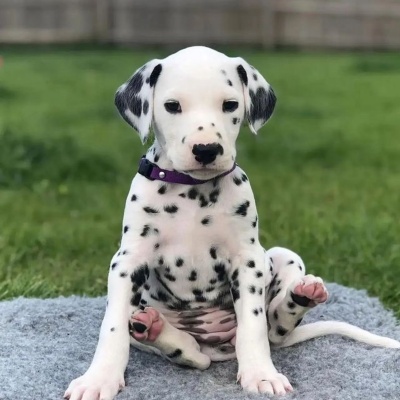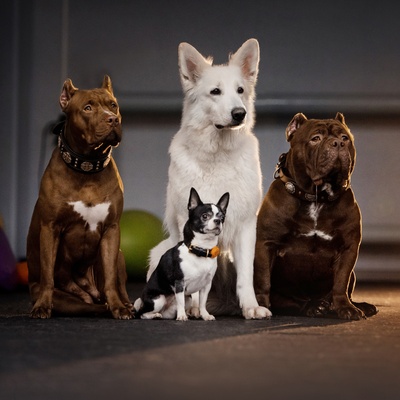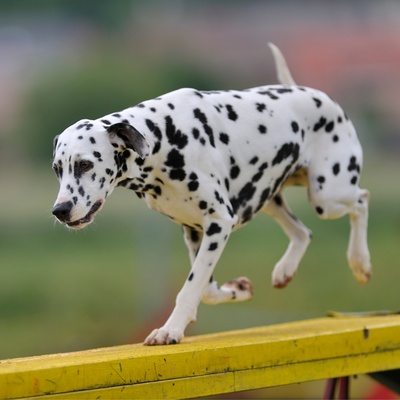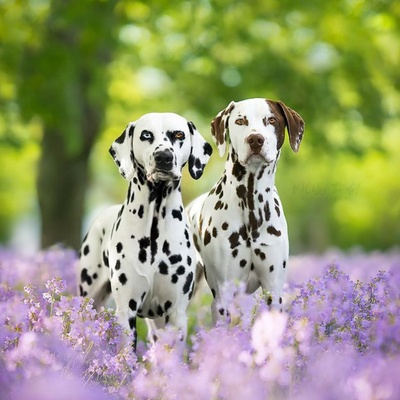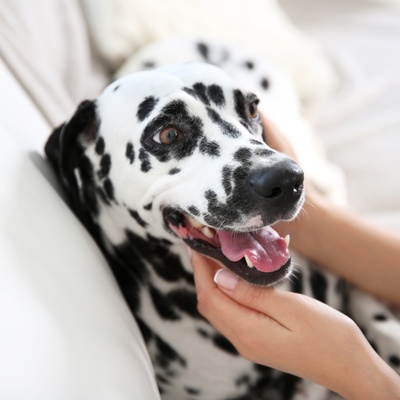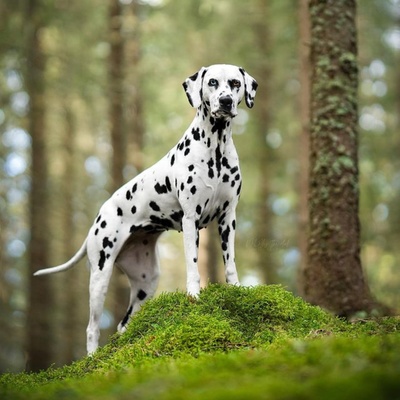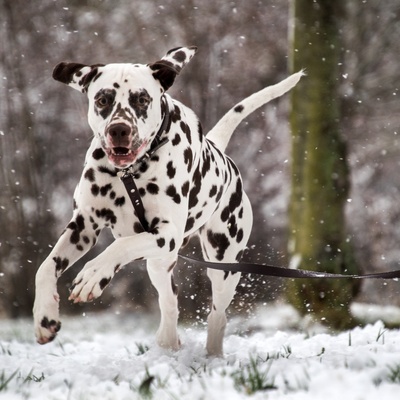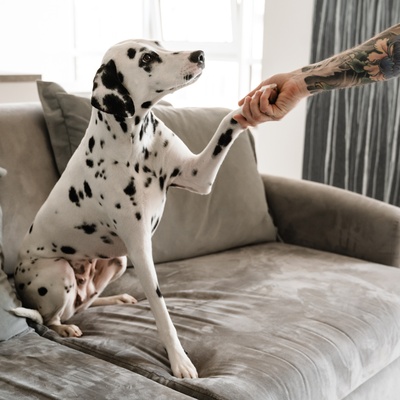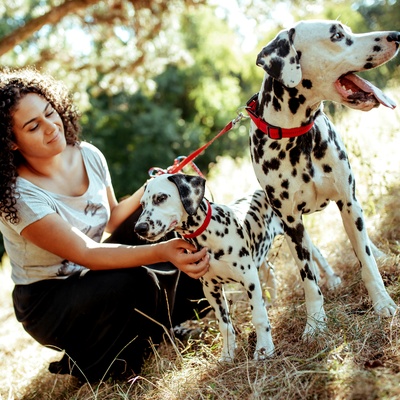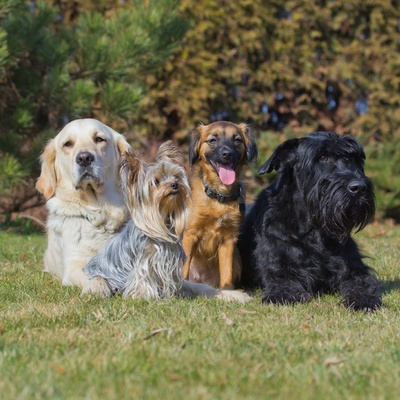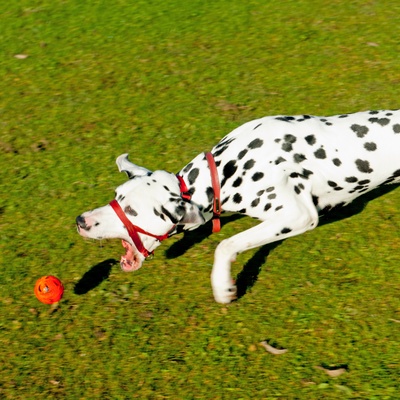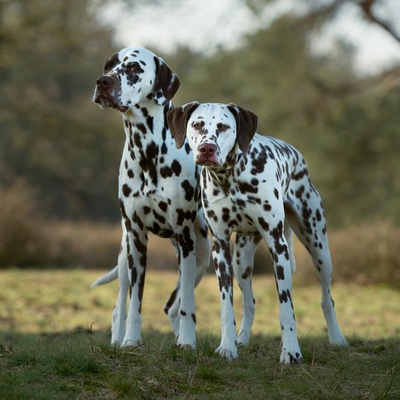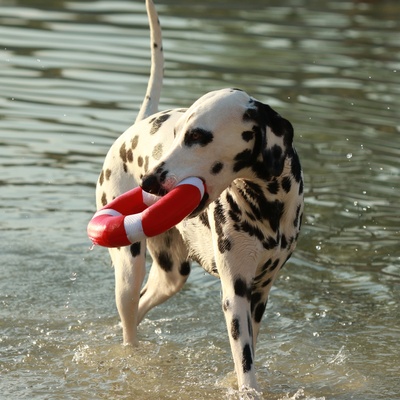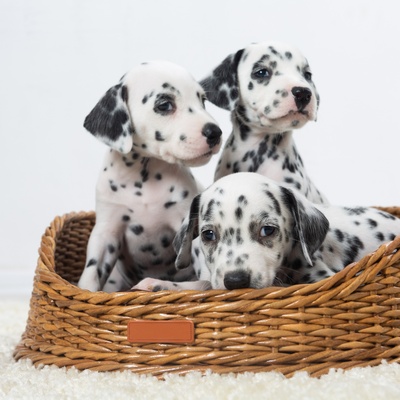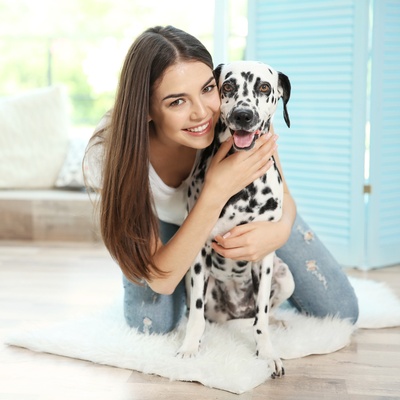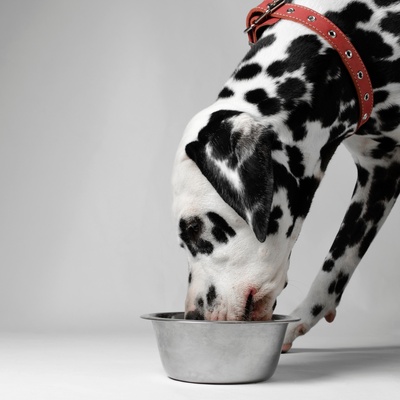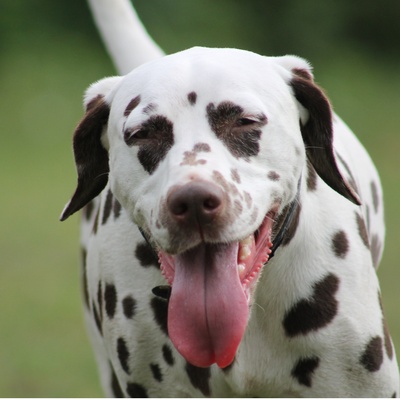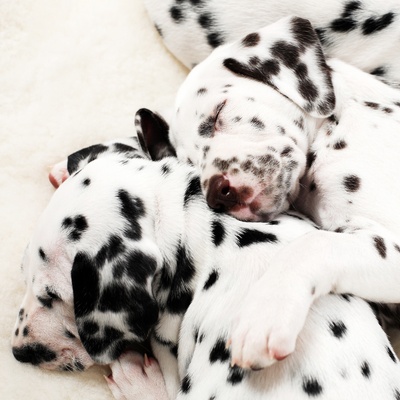Introducing the Dalmatian
Discover all there is to know about the Dalmatian: its characteristics, behavior, training, and its cost.
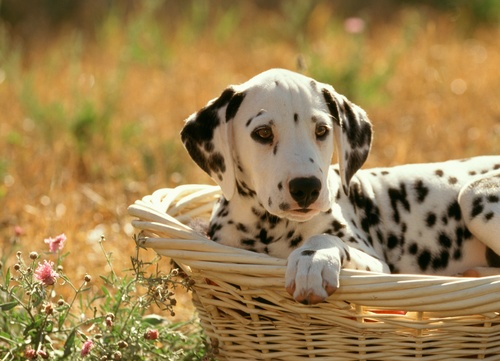
Discover all there is to know about the Dalmatian: its characteristics, behavior, training, and its cost.
The Dalmatian's origins trace back to historical regions of Europe, where they were primarily used as carriage dogs, a testament to their enduring stamina and distinguished appearance. Today, the Dalmatian stands as one of the most recognizable breeds, celebrated for its unique spotted coat and striking posture. Known for their bravery and versatile skill set, Dalmatians have served in various roles from firefighting companions to stars of the silver screen.
Their nature is loyal and affectionate, making them excellent family pets. Dalmatians are known for their sociable demeanor, eagerly displaying their affection towards owners and often seeking out human companionship. Their distinctive spots and dynamic personalities ensure they are not just pets but a part of the family, bringing joy and energy to any home.
This section outlines the unique features of the Dalmatian breed.
Dalmatians belong to the utility group (6), which encompasses breeds known for their versatility in performing practical tasks. These dogs are celebrated for their endurance and intelligence.
Dalmatians are medium to large-sized dogs. They typically stand between 19 to 24 inches at the shoulder and weigh anywhere from 45 to 70 pounds, showcasing a muscular and balanced stature.
The Dalmatian sports a short, dense, and sleek coat. This type of fur is smooth to the touch, with their famous spots providing an eye-catching pattern.
The hallmark of the Dalmatian is its white coat adorned with black or liver-colored spots. The spots vary in size and are randomly distributed across the body, making each Dalmatian's coat unique.
Dalmatians thrive in environments where they can get plenty of exercises. They adapt well to both city and country living, provided they have enough space to run and engage in physical activities.
Known for their friendly and outgoing nature, Dalmatians are highly sociable dogs. They get along well with children and other animals, making them excellent family pets.
Generally, Dalmatians are a healthy breed with a life expectancy of 11 to 13 years. However, they are predisposed to certain genetic conditions such as deafness and urinary stones.
Dalmatians are intelligent and eager to please, which makes them relatively easy to train. They respond best to positive reinforcement techniques.
We can help!
Every dog has its own character, and so do you. Making the right choice will ensure his well-being and yours.
Take our quiz to find out which breed is right for you, based on your personality, lifestyle, location and many other criteria.
Don't wait any longer and take the quiz to find out the answer!
Dalmatians are medium-sized, muscular dogs renowned for their unique, spotted coat and striking, athletic build. Their sleek, white fur is adorned with distinctive black or liver spots, and their expressive faces are often highlighted by a pair of alert, bright eyes.
Dalmatians exhibit a notable size difference between genders. Females typically stand between 19 and 22 inches, while males can reach heights of 21 to 24 inches. In terms of weight, females usually weigh around 45 to 55 pounds, and males can weigh between 55 and 70 pounds.
Dalmatians grow relatively fast, with puppies rapidly gaining weight until they are about 6 months old. By the age of 12 to 16 months, they generally reach their full adult size and weight, embodying their breed's characteristic balance and elegance.
Dalmatians boast a short, dense coat that is sleek and shiny. Their fur lies close to the body, showcasing their muscular physique. This breed does not have fringes or waves, but the smooth texture and glossy finish make their spotted coat truly stand out.
The Dalmatian's coat is immediately recognizable for its unique color pattern. The base color is pure white with distinctive spots that can be either black or liver-colored. The spots vary in size and are randomly distributed across the body, with puppies born white and spots developing as they grow.
Maintaining the Dalmatian's coat is relatively straightforward due to its length and texture. Despite this, they are known to shed throughout the year, requiring regular brushing to manage loose hair and keep their coat in good condition. Weekly brushing is usually sufficient to remove dead hair and maintain the coat's shine.
Dalmatians do not need frequent baths; however, occasional baths will help to keep their coat clean and reduce shedding. It's important to note that Dalmatians have sensitive skin, so choosing the right grooming products is essential for their health and comfort.
The Dalmatian is a model of grace and symmetry, embodying a balanced and well-proportioned appearance. Its head is distinguished, with a pronounced snout and a broad skull, giving it an alert and intelligent expression. The eyes of a Dalmatian are round, sparkling with a lively expression, and can be dark or amber in color, adding to their expressive demeanor. Positioned high on the head, their ears are medium-sized, thin, and taper to a point, hanging close to the head.
The Dalmatian's body showcases a strong, athletic build with a deep chest and well-defined musculature, ideal for the endurance this breed is known for. This sleek physique is complemented by a long, slender tail that curves upwards slightly, adding to their elegant stance.
Dalmatians are known for their loyal, protective, and affectionate nature, making them excellent companions and family members.
With over 400 recognized dog breeds divided into 10 groups, each group represents breeds with common traits and purposes. The Dalmatian falls into the utility group (6), which is diverse and includes breeds known for their specific skills beyond hunting and herding, such as rescue work, pulling sleds, and companionship.
Dalmatians, with their strong instinct, remarkable intelligence, and friendly, outgoing nature, stand out within this category. Their primary role has evolved from working dogs to beloved companions, showcasing their versatile and adaptable nature.
Dalmatians are dynamic and spirited, embodying a blend of high energy and a playful nature. This breed is known for its boundless enthusiasm and love for activity, making them an ideal companion for those with an active lifestyle. Their affectionate nature means Dalmatians form strong bonds with their owners, thriving on attention and interaction.
For a Dalmatian to develop into a well-adjusted dog, it requires an owner who is not only present but also engaged in their physical and emotional well-being, ensuring they receive ample exercise, mental stimulation, and love.
The Dalmatian's sociability and generosity towards humans and other animals alike are notable traits of the breed. They are exceptionally friendly and enjoy the company of humans, making them wonderful family pets. Dalmatians are also known for being great companions for children, offering both playfulness and a protective instinct.
However, like all dogs, introducing sociability at a young age is crucial. Early socialization helps ensure that Dalmatians grow to be well-mannered and comfortable around a variety of people, pets, and situations, fostering their innate sociable nature.
Take the test and find out the dog breed that matches your personality and lifestyle.
Dalmatians are remarkably adaptable and can thrive in various living environments, from apartments to sprawling country homes, and in both urban and rural settings. However, the key to their happiness lies in the attention and engagement they receive from their owners. Daily walks are essential, with a recommendation of at least two walks per day, each lasting around 45 minutes to an hour, to ensure they remain physically and mentally healthy.
While Dalmatians can adjust to living in smaller spaces, they benefit greatly from having access to outdoor areas where they can explore and expend energy. These intelligent and curious dogs appreciate environments that cater to their need for physical activity and exploration. A yard or nearby park where they can run freely and play is ideal. However, it's important for these spaces to be safe and secure, as Dalmatians can be quite adventurous.
Dalmatians are recognized for their sharp intelligence and eagerness to learn, making them relatively straightforward to train. They possess a quick wit and are capable of understanding and following commands with ease. However, training a Dalmatian requires consistency, patience, and positive reinforcement techniques to fully harness their potential.
Given their high energy levels and intelligent minds, incorporating variety and challenges into their training routine can keep them engaged and motivated. To safeguard their adventurous spirit, outfitting them with a GPS collar can provide peace of mind by preventing losses or unexpected escapes, ensuring they remain safe and traceable on their explorations.
Dalmatians exhibit remarkable listening skills, making them responsive to training cues and commands. Their willingness to please, combined with their alertness, allows them to excel in obedience training. Special attention should be given to socialization from an early age to develop their sociability towards people and other animals.
Unique training characteristics of Dalmatians include their stamina and agility, which can be leveraged in activities such as agility courses, obedience competitions, and long-distance running. Their sociable nature also makes them excellent candidates for roles that involve interaction, such as therapy work. The key to successful training lies in understanding and tapping into their unique traits and inclinations.
Dalmatians are generally known for their robust health and active lifestyle. However, like all breeds, they require daily care and attention to prevent diseases and maintain their well-being. Ensuring a healthy lifestyle for your Dalmatian involves regular exercise, proper nutrition, and preventative health measures.
Dalmatians are typically a healthy and hardy breed, renowned for their energy and stamina. Despite their overall robustness, they are predisposed to certain health conditions. Notable among these are deafness, with a percentage of Dalmatians being born either partially or completely deaf, and urinary stones, due to their unique urinary system. Skin allergies and hip dysplasia are also concerns within the breed.
Symptoms to watch for include lack of response to auditory cues, difficulty during urination, and signs of discomfort when moving. Dalmatians have a life expectancy of about 10 to 13 years, reflecting their generally good health when properly cared for.
Regular veterinary care is crucial for a Dalmatian's health, encompassing vaccinations, deworming, and parasite control. Daily care practices include brushing their short coat weekly to keep it clean and minimize shedding, regular ear cleaning to prevent infections, dental care to avoid tartar buildup, and nail trimming to prevent discomfort and mobility issues.
Dalmatians can have specific dietary needs to prevent urinary problems; thus, consulting a vet for a tailored nutrition plan is important. Awareness of the breed's potential for allergies is vital, with a need for ongoing vet consultations to manage any arising issues. Dalmatians are not considered hypoallergenic and can shed moderately throughout the year.
Dalmatians, like all dog breeds, have unique nutritional needs that must be met to maintain their health, energy, and overall well-being. A balanced diet is crucial for Dalmatians, requiring a careful mix of proteins, vitamins, and minerals. High-quality kibble formulated for medium to large breeds can provide a solid foundation for their diet, ensuring they receive all the necessary nutrients. Given Dalmatians' predisposition towards urinary stones, it's important to select foods that help maintain a healthy urinary tract.
For those Dalmatians with higher activity levels, supplementing their diet with lean proteins such as chicken, turkey, and lean beef can be beneficial, but it's essential to keep fat intake moderate to prevent weight gain and other health issues. Regular, scheduled feeding times and portion control are vital to prevent overeating, as Dalmatians can be prone to obesity if their diet and exercise are not properly managed.
The Dalmatian is highly regarded for its unique appearance and energetic temperament, making it a popular choice among dog enthusiasts. There are several reputable breeders specializing in Dalmatians, but it's important to consider several factors before adopting to ensure you're ready for the commitment.
Adopting a Dalmatian requires careful consideration to ensure you make an informed decision. It's crucial to select a reputable breeder, which involves visiting the premises to observe the living conditions and behavior of the puppies and their parents. Assessing the health of the puppy and its parents is vital, with reputable breeders being transparent about any hereditary illnesses.
Lastly, you must have your dog microchipped by the age of 8 weeks old and have their details registered on a relevant database like Petlog or Animal Tracker. This is a legal requirement in Great Britain, and non-compliance could result in a £500 fine. Your vet can microchip your dog for a small fee, or alternatively, any Blue Cross center will do it for free.
The cost of acquiring a Dalmatian puppy can vary significantly based on factors such as the breeder's reputation, the dog's lineage and pedigree, and the age of the puppy. Typically, Dalmatian puppies can cost anywhere from
to
from reputable breeders.
Beyond the initial purchase price, prospective Dalmatian owners should consider the ongoing costs of ownership, including veterinary care, food, and other essentials. The annual expense of maintaining a Dalmatian can range from
to
, depending on healthcare, diet, and other care requirements.
Choosing a dog that matches your personality and lifestyle will ensure your well-being and his!
To access the most relevant information, suitable payment methods, and delivery in your region, please select the website corresponding to your country.
